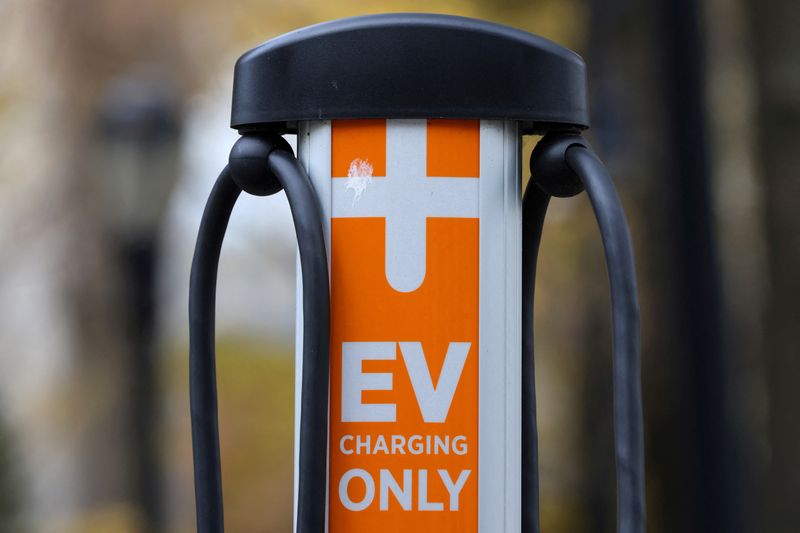
EV charger makers brace for slowdown as new Made In America rules kick in
(C) Reuters. FILE PHOTO: An electric vehicle charge station by ChargePoint, Inc. is seen outside New York City Hall in Manhattan, New York, U.S., December 8, 2021. REUTERS/Andrew Kelly/File Photo
By Abhirup Roy and Hyunjoo Jin
SAN FRANCISCO (Reuters) – Manufacturers and operators of electric vehicle chargers in the United States are bracing for a slowdown in production and deployment as they scramble to comply with “Made in America” terms of a $7.5 billion federal program meant to accelerate the industry.
Long-awaited rules laid out by the White House last month are part of President Joe Biden’s effort to build an electric-friendly highway system by 2030, tackling climate change and creating local jobs.
Requirements to immediately start assembling the chargers at U.S. factories and to use U.S.-made iron or steel enclosures have caught many in the EV charging industry off guard, according to company executives and industry experts.
The biggest makers and network operators of EV charging stations include Tesla (NASDAQ:TSLA) Inc, ChargePoint Holdings Inc, EVgo Inc and Electrify America.
Companies and some state officials who will manage the federal funds are warning that the country currently lacks the domestic production capacity – particularly on high-speed chargers – and that strict enforcement will slow the rollout, drive up costs and possibly hurt the industry Biden seeks to nurture.
“Everyone was hoping that there would be a waiver on the Buy America and Made in America,” said Aatish Patel, co-founder of XCharge North America, which imports chargers from its manufacturing plant in Beijing. “That throws a wrench in a lot of people’s plans.”
A requirement to source 55% of the cost of components from the United States was deferred until mid-2024, but executives expected deferrals in other terms as well.
Patel said it typically takes 12-18 months to move production from another country, adding that XCharge, one of the largest sellers of EV fast chargers in the European Union, was accelerating setting up a U.S. facility to comply with the rules, which could push costs up by about 25-30%.
About two-thirds of the federal plan funding will go to states while applicants such as cities, counties and Native American tribes can compete for the rest.
In Arizona, the state’s Department of Transportation is leading efforts to build charging stations, and expects $76.5 million in federal charging funds over the next five years.
“Buy America is likely to be another constraint in terms of how fast we can get the stations out,” Thor Anderson, a project manager at the Arizona Department of Transportation, told Reuters. “Everybody is going to be looking to install new charging stations at once so that’s going to put a lot of pressure on the manufacturing of chargers.”
But the federal government said it expects there will be enough chargers to meet the “limited” initial demand even as the program ramps up.
TESLA’S EDGE
Fast chargers can add hundreds of miles of driving range in an hour or less. That compares with the five hours or so it takes the less-expensive Level 2 chargers to top up a vehicle. There are about 30,000 fast-charging machines around the nation, of which about 60% are made and operated by the industry’s leading EV maker, Tesla. The particularly powerful charger models can cost more than $100,000.
Tesla makes them at its factory in Buffalo, New York, meeting the requirements for final assembly. The stakes are higher for other companies that are yet to set up their manufacturing in the U.S. and depend on the federal program for much of their revenue.
At the behest of the U.S. government, Tesla has started to open its charging stations to non-Tesla cars, but it is not clear whether it will bid for federal funds. Tesla did not respond to a request for comment.
The first, $1.25 billion round of the Biden buildout is focused squarely on the highway fast chargers, with later rounds including slower chargers for overnight charging, for instance.
FRUSTRATING SPEED BUMP
EVgo Inc, a charging network operator with more than 850 fast-charging locations, said there is a process to individually request for a deferral of the “Made in America” rules but it is unsure if the government will allow that. Its South Korean charger manufacturer, SK Signet Inc, is planning to open a Texas factory to produce up to 10,000 direct-current fast chargers annually by 2026.
But EVgo Chief Commercial Officer Jonathan Levy said there is risk that 2023 projects could wait while the supply chain catches up, and it is difficult to plan.
“You have this uncertainty. Am I going to get that waiver? Do I need to hold off? What does it look like?”
Shares of EVgo jumped nearly 10% on Feb. 15, when the U.S. government announced the new rules for chargers. Since then, they have lost about a quarter of their value. Rivals ChargePoint, Wallbox, Blink Charging Co (NASDAQ:BLNK) and Tritium have dropped about 30% over the same period compared with a drop of near 5% in the S&P 500.
Elliot Johnson, chief investment officer at Evolve ETFs, which manages over $4 billion in assets, including investments in EVgo and Tesla, said the new rules were frustrating but only speed bumps.
“It only makes those who are successful more valuable,” he told Reuters.
Terms And Conditions
Privacy Policy
Risk Warning
Do not sell my personal information
(C) 2007-2023 Fusion Media Limited. All Rights Reserved.
Risk Disclosure: Trading in financial instruments and/or cryptocurrencies involves high risks including the risk of losing some, or all, of your investment amount, and may not be suitable for all investors. Prices of cryptocurrencies are extremely volatile and may be affected by external factors such as financial, regulatory or political events. Trading on margin increases the financial risks.Before deciding to trade in financial instrument or cryptocurrencies you should be fully informed of the risks and costs associated with trading the financial markets, carefully consider your investment objectives, level of experience, and risk appetite, and seek professional advice where needed.Fusion Media would like to remind you that the data contained in this website is not necessarily real-time nor accurate. The data and prices on the website are not necessarily provided by any market or exchange, but may be provided by market makers, and so prices may not be accurate and may differ from the actual price at any given market, meaning prices are indicative and not appropriate for trading purposes. Fusion Media and any provider of the data contained in this website will not accept liability for any loss or damage as a result of your trading, or your reliance on the information contained within this website.It is prohibited to use, store, reproduce, display, modify, transmit or distribute the data contained in this website without the explicit prior written permission of Fusion Media and/or the data provider. All intellectual property rights are reserved by the providers and/or the exchange providing the data contained in this website.Fusion Media may be compensated by the advertisers that appear on the website, based on your interaction with the advertisements or advertisers.

